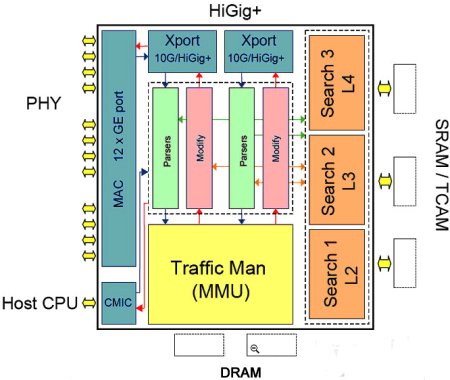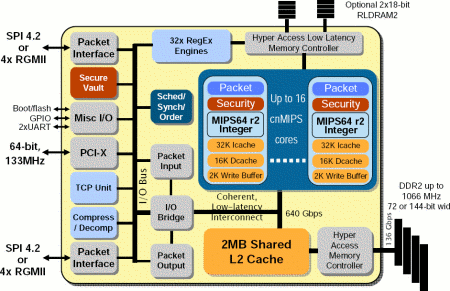Chip vendors partner on Linux switches
Dec 4, 2007 — by Eric Brown — from the LinuxDevices Archive — 12 viewsTwo fabless networking chip vendors will collaborate on Linux-based reference designs for managed enterprise switches and SOHO/SMB routers. The designs will combine Cavium's multi-core MIP64-based Octeon processors with Broadcom's StrataXGS and RoboSwitch Gigabit Ethernet switches, and run Linux along with LVL7's Fastpath TCP/IP stack.
The partnership, which also gives Cavium access to Broadcom's “HiGig” 10Gbps Ethernet switch technology, is a response to the widespread use of the two companies' processors in the same networking boards, claims Cavium. Potential customers for the joint reference designs include manufacturers of intelligent enterprise switches and Layer 4+ switches based on Broadcom's StrataXGS networking chip, and vendors of SOHO/SMB routers based on Broadcom's RoboSwitch chip.

Broadcom StrataXGS diagram
(Click to enlarge)
The reference designs will incorporate Octeon processors on both the control plane and as a services processor, says Cavium. Replacing separate control and data-plane processors with a single highly integrated SoC (system-on-chip) was the company's overarching goal when it launched the (for the time) massively multi-core Octeon architecture, back in 2004 (story).

Octeon Plus CN5860 block diagram
(Click to enlarge)
Cavium already supports Broadcom's HiGig 10Gbps Ethernet interface technology in its latest Octeon processors that have 10-Gigabit interfaces, but says the new licensing should improve the integration. The protocol, which has been around for a few years, but was recently upgraded, enhances Ethernet switching for improved scalability with stacking and QoS features, says Cavium. Broadcom's HiGig 10Gbps expansion ports are said to support explicit priority, port trunking, and mirroring functions across switch elements, enabling up to 32 Broadcom BCM5692 switches to interconnect.
On the software side, the designs will use a commercial Linux TCP/IP stack from LVL7. Long-time Broadcom partner LVL7 touted support for RoboSwitch about two years ago, and support for StrataXGS about a year ago, with the release of Fastpath 4.4.3.
LVL7 also recently adopted Wind River Linux as a preferred platform, suggesting that the Cavium/Broadcom designs might run Wind River's Platform for Network Equipment, Linux Edition, although the companies did not stipulate that.
Martin Lund, GM of Broadcom's network switching unit, stated, “We are seeing the rapid adoption of gigabit connectivity with the need for intelligent services at line-rate in both enterprise and SMB/home networks.”
Cavium CEO Syed Ali stated, “Customers are looking for processor solutions that scale from home/SMB to enterprise-class performance with software compatibility.”
Cavium achieved the biggest design win yet for its MIPS64-based Octeon processors this summer, when tier-one NEP (network equipment provider) Motorola announced its ATCA-9301 blade, which incorporates one or two of Cavium's Octeon Plus CN5860 processors. Equipped with 16 MIPS64 cores clocked at 900MHz, each CN5860 incorporates hardware engines for TCP offload, compression/decompression, regex, cryptography, and packet queuing and scheduling. Octeon processors ship with MontaVista or Wind River Linux distros.
Availability
Neither Cavium Networks or Broadcom provided information on pricing or availability for the integrated Octeon/StrataXGS and Octeon/RoboSwitch reference designs.
This article was originally published on LinuxDevices.com and has been donated to the open source community by QuinStreet Inc. Please visit LinuxToday.com for up-to-date news and articles about Linux and open source.